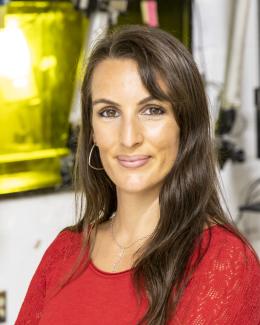Abstract
An irradiation experiment using tristructural isotropic (TRISO) fuel particles and the miniature fuel (MiniFuel) irradiation vehicle was performed in Oak Ridge National Laboratory’s High Flux Isotope Reactor (HFIR) to support development of the Kairos Power fluoride salt–cooled, high-temperature reactor (KP-FHR). This paper describes modeling predictions of temperatures and fuel burnup for the as-built experiment. An uncertainty quantification (UQ) analysis was performed to determine the effect of TRISO particle volume and position on the temperature predictions at various fuel heat generation rates (HGRs). This UQ study utilized fuel kernel position and volume measurements previously collected using X-ray computed tomography (XCT) techniques and Monte Carlo sampling methods to generate fuel compact cases that were then analyzed using a finite element thermal model. The UQ analysis indicated that uncertainty in calculated temperatures caused by varying TRISO particle arrangement is relatively small, even at high fuel HGR. Final predictions of particle temperatures throughout the irradiation are shown to be relevant to KP-FHR normal and off-normal operating conditions and to previous TRISO irradiation experiments. The combination of XCT with UQ analyses will inform post-irradiation examination (PIE) of the irradiated fuel compacts, and these analyses can be used to develop fuel performance models for coated particle fuel forms. Both PIE of separate-effects irradiation data and enhanced fuel performance modeling support accelerated qualification of TRISO fuels for a broad range of advanced reactor applications. The novel approach demonstrated here of measuring TRISO particle configurations with XCT methods and generating representative fuel compacts for finite element modeling and UQ analysis could be leveraged by the broader particle fuel community in the development of other TRISO fuel experiments in which these variables may have a significant impact on key outcomes.







